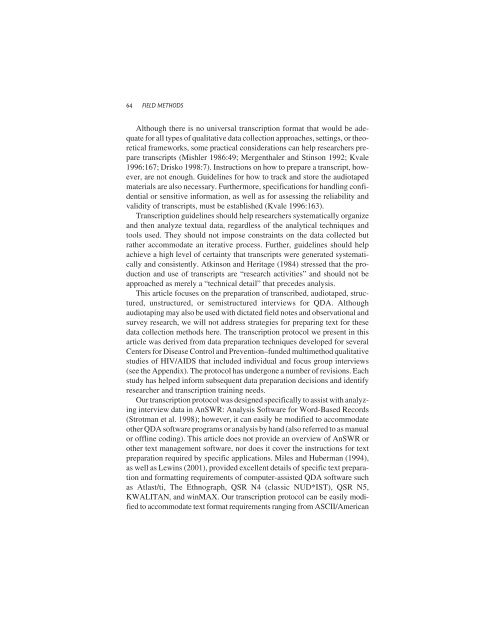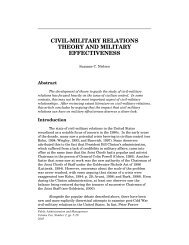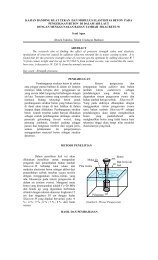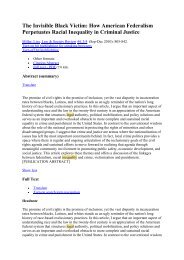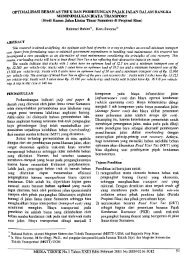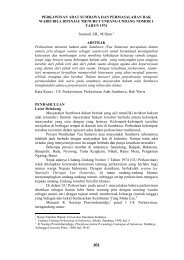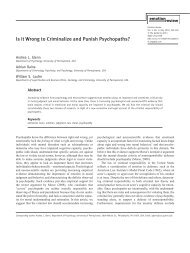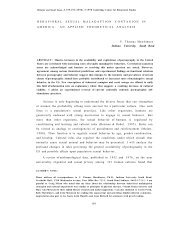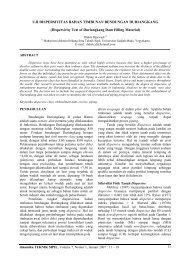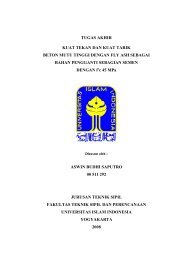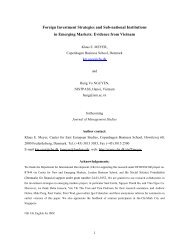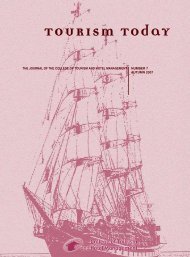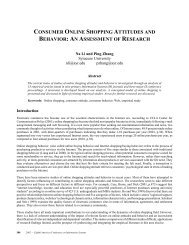Beyond the Qualitative Interview: Data Preparation and ... - E-Journal
Beyond the Qualitative Interview: Data Preparation and ... - E-Journal
Beyond the Qualitative Interview: Data Preparation and ... - E-Journal
You also want an ePaper? Increase the reach of your titles
YUMPU automatically turns print PDFs into web optimized ePapers that Google loves.
64 FIELD METHODS<br />
Although <strong>the</strong>re is no universal transcription format that would be adequate<br />
for all types of qualitative data collection approaches, settings, or <strong>the</strong>oretical<br />
frameworks, some practical considerations can help researchers prepare<br />
transcripts (Mishler 1986:49; Mergenthaler <strong>and</strong> Stinson 1992; Kvale<br />
1996:167; Drisko 1998:7). Instructions on how to prepare a transcript, however,<br />
are not enough. Guidelines for how to track <strong>and</strong> store <strong>the</strong> audiotaped<br />
materials are also necessary. Fur<strong>the</strong>rmore, specifications for h<strong>and</strong>ling confidential<br />
or sensitive information, as well as for assessing <strong>the</strong> reliability <strong>and</strong><br />
validity of transcripts, must be established (Kvale 1996:163).<br />
Transcription guidelines should help researchers systematically organize<br />
<strong>and</strong> <strong>the</strong>n analyze textual data, regardless of <strong>the</strong> analytical techniques <strong>and</strong><br />
tools used. They should not impose constraints on <strong>the</strong> data collected but<br />
ra<strong>the</strong>r accommodate an iterative process. Fur<strong>the</strong>r, guidelines should help<br />
achieve a high level of certainty that transcripts were generated systematically<br />
<strong>and</strong> consistently. Atkinson <strong>and</strong> Heritage (1984) stressed that <strong>the</strong> production<br />
<strong>and</strong> use of transcripts are “research activities” <strong>and</strong> should not be<br />
approached as merely a “technical detail” that precedes analysis.<br />
This article focuses on <strong>the</strong> preparation of transcribed, audiotaped, structured,<br />
unstructured, or semistructured interviews for QDA. Although<br />
audiotaping may also be used with dictated field notes <strong>and</strong> observational <strong>and</strong><br />
survey research, we will not address strategies for preparing text for <strong>the</strong>se<br />
data collection methods here. The transcription protocol we present in this<br />
article was derived from data preparation techniques developed for several<br />
Centers for Disease Control <strong>and</strong> Prevention–funded multimethod qualitative<br />
studies of HIV/AIDS that included individual <strong>and</strong> focus group interviews<br />
(see <strong>the</strong> Appendix). The protocol has undergone a number of revisions. Each<br />
study has helped inform subsequent data preparation decisions <strong>and</strong> identify<br />
researcher <strong>and</strong> transcription training needs.<br />
Our transcription protocol was designed specifically to assist with analyzing<br />
interview data in AnSWR: Analysis Software for Word-Based Records<br />
(Strotman et al. 1998); however, it can easily be modified to accommodate<br />
o<strong>the</strong>r QDA software programs or analysis by h<strong>and</strong> (also referred to as manual<br />
or offline coding). This article does not provide an overview of AnSWR or<br />
o<strong>the</strong>r text management software, nor does it cover <strong>the</strong> instructions for text<br />
preparation required by specific applications. Miles <strong>and</strong> Huberman (1994),<br />
as well as Lewins (2001), provided excellent details of specific text preparation<br />
<strong>and</strong> formatting requirements of computer-assisted QDA software such<br />
as Atlast/ti, The Ethnograph, QSR N4 (classic NUD*IST), QSR N5,<br />
KWALITAN, <strong>and</strong> winMAX. Our transcription protocol can be easily modified<br />
to accommodate text format requirements ranging from ASCII/American


